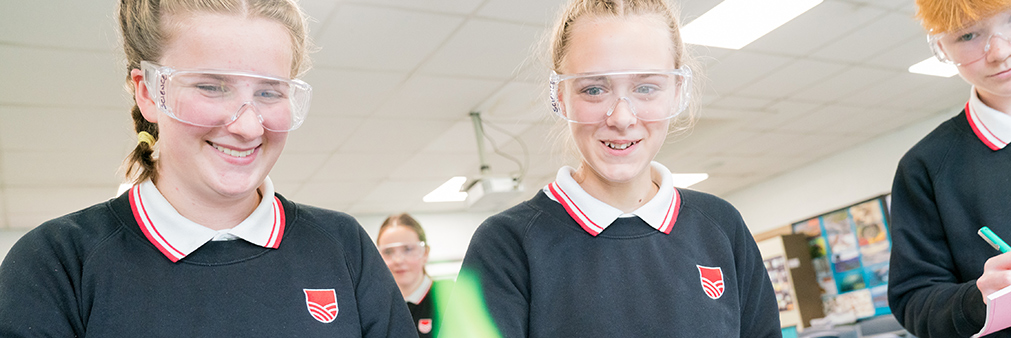
Science
Curriculum Vision
‘It is very important for young people to keep their sense of wonder and keep asking why.’
- Stephen Hawking -
At the heart of our curriculum is the idea that science is all around us. It has been specifically developed to make science relevant to our students, in terms of both local and national knowledge, and to give an understanding of where and how abstract concepts are used in real life situations. In short, our curriculum prepares our students to be scientifically literate in an ever-changing world.
Our aim is to create independent, confident and resilient students who are not afraid to ask questions and push the boundaries of knowledge. All students learn to understand the five key principles of science: interdependence, cells, reactions, particles and forces; on top of this, we ensure an appreciation of the practical nature of the subject. The curriculum is responsive to the ever-evolving nature of science and draws on the latest discoveries, linking them to long held theories. Lessons are a mix of theory and practical work, supported by regular homework to strengthen knowledge retrieval across all years.
Knowledge and Skills
Our practical work is designed to instil curiosity in our students and to develop a love of independent enquiry, as well as helping them gain valuable questioning skills. In year 7, students learn some of the theoretical knowledge (concepts, laws, and models) related to the five key principles. This is covered through a variety of topics which create balance between the three subject areas of biology, chemistry and physics. Alongside this, students see the theories in action during the significant amount of practical time devoted to experiments and hands-on lessons. Highlights for students are learning to confidently use Bunsen burners, create mini explosions and design and plan their own investigations. The constant links we make between theory and practical application aids the students learning and progress.
In year 8 we start to challenge students to think more deeply and to make links between what was taught in year 7 and the new knowledge that is being gained. We have carefully planned STEM events to support learning in the wider context and students have the opportunity to take part in events such as a murder mystery case, perfume making and designing and racing hovercrafts and dragsters.
As they move further up the school, students begin to appreciate the complexity of science across the different disciplines as we start laying the foundation for GCSE.
Context
We are fully inclusive during the options process at GCSE, and no matter a student’s ability, triple science is an option for everyone. By the time students leave the science department we hope to have expanded their minds, promoted curiosity and given them the skills to successfully evaluate and solve problems. We aim to open students’ eyes to what is on their doorstep as well as the wider world beyond the hills and the opportunities they have in the scientific community.
You can find our year 7 to 9 curriculum here.
You can find our year 10 and 11 Science Trilogy curriculum here and our Science Separate Science curriculum here.
Examination Information
| Qualification GCSEs | GCSE Combined Science (2 GCSEs) | GCSE Biology | GCSE Chemistry | GCSE Physics |
|---|---|---|---|---|
| Board | AQA | AQA | AQA | AQA |
| Syllabus number | 8464 | 8461 | 8462 | 8463 |
| Website link | www.aqa.org.uk | |||
| Assessment details: | 100% terminal exam sat at the end of Year 11 | 100% terminal exam sat at the end of Year 11 | 100% terminal exam sat at the end of Year 11 | 100% terminal exam sat at the end of Year 11 |
| Recommended coursebooks | AQA GCSE Science ( 9-1)Chemistry Biology and Physics Published by Collins Series Editor Ed Walsh | AQA Biology Published by Collins Series Editor Ed Walsh | AQA Chemistry Published by Collins Series Editor Ed Walsh | AQA Physics Published by Collins Series Editor Ed Walsh |
| Recommended revision guides | CPG Science, available from the prep room | |||
| Recommended websites | bbc.co.uk/gcsebitesize educake.co.uk gojimo senecalearning.com |

